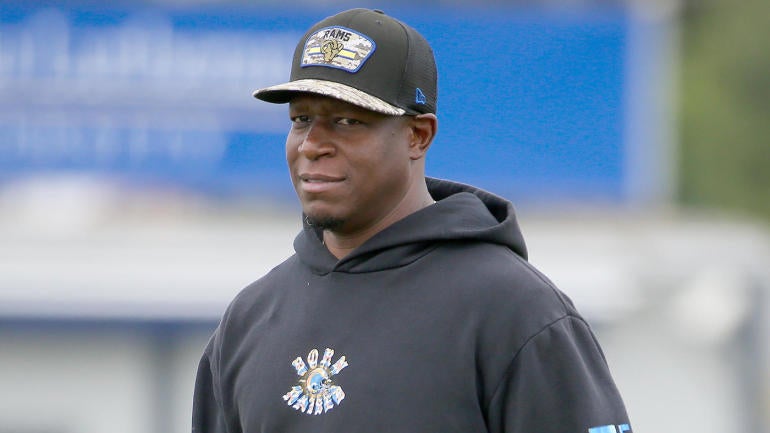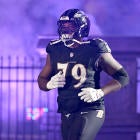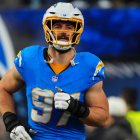
Last Thursday afternoon, inside the NFL league office, there was a collective exhale of breath that had been held for years.
The Atlanta Falcons had named Raheem Morris as their next head coach, and that meant four of the six head-coaching hires so far this cycle were men of color. It had already clinched the most diverse cycle for head-coaching hires ever for an NFL that has tried -- and for years, has failed -- to get these kinds of results.
"It's our toughest area and we're finally making progress," one league source told CBS Sports. "Things we've focused on the last two to four years are finally coming to fruition."
It's not a victory lap for the league so much as an acknowledgement of a breakthrough. The NFL head-coach fraternity has always been majority white, and the league's recent efforts to diversify that specific group never seemed to work.
Between 1963 and 2023, 26 men of color were hired to be head coaches in the NFL, according to league data. Fifteen of those men were hired between 2012 and 2023, while 62 white coaches got their jobs during that same time period.
The league office has regularly made tweaks to the Rooney Rule. It created a Diversity Advisor Committee. The league mandated diversity training for teams hiring head coaches, and it encouraged a search committee that includes white and people of color in the process.
But all along, people around the league said a similar refrain: You can lead a horse to water. No matter what programs the league instituted, it was still up to NFL team owners to make the decision.
But a different league source told me they felt a change coming this cycle because "the conversations were different" with NFL owners and decision-makers.
The New England Patriots filled their vacancy first by promoting Jerod Mayo to head coach, which had already been written into his contract the year before. The Raiders locked in on Antonio Pierce, taking the interim tag off Pierce. Then Carolina hired Dave Canales, a Mexican-American and the fifth Latino coach in NFL history. And then the Falcons hired the first Black head coach in franchise history with Morris.
The Chargers ran a 15-coach search before hiring leading candidate Jim Harbaugh, and the Titans had former Panthers offensive coordinator Thomas Brown (who is Black) as a finalist for the job before going with Brian Callahan.
Seattle and Washington have yet to make hires. Ejiro Evero and Patrick Graham remain candidates in Seattle with Aaron Glenn and Anthony Weaver getting second interviews with the Commanders.
"When you make a policy change, or have training, or emphasize the process can be done better and particular people aren't getting a fair look, it takes time for an organization to buy into that and live that on a continual basis," one source said. "Then It's a domino effect."
The diversity success this year is just this year, though. While everyone I speak with acknowledges the positives of this cycle so far, there's also context. Mayo was already hand-picked in the building. Morris was a known entity in Atlanta. Canales had a previous relationship with new Panthers GM Dan Morgan. And Pierce had been the interim in Las Vegas since Halloween.
"Even though the numbers are improved, it's still following a pattern that's been there," said one team executive. "This hiring cycle shows it still comes down to relationships."
That's part of the reason the NFL has expanded the interview requirements in hiring searches. Not only is there exposure to diverse candidates, but relationships can be built in one cycle and renewed a year or two later.
The NFL recently expanded the Rooney Rule to require teams interview at least two external minority candidates for head coach and general manager jobs. One of the points was to normalize a diverse candidate pool in these searches, rather than the "othering" of just one minority candidate in some previous searches.
For all the tweaks done, there need to be more. Sources tell CBS Sports the league will look closely at accounting for "succession plans" within teams for the upcoming cycle.
In the case of Mayo in New England, he had a provision in his contract that allowed him to assume the head-coaching role once it was vacant. But that's not what we're talking about here.
Take the Raiders. Pierce proved over the final nine weeks of the season that he was the obvious choice for permanent head coach. Yet Raiders owner Mark Davis still had to fulfill the Rooney Rule by having Leslie Frazier and Kris Richard interview for the head-coaching position. If there had been an understanding or agreement with the league that the interim coach had done enough over a long enough period of time to earn the job, perhaps the other requirements could have been waived.
It will take plenty of minds and plenty of time to come up with the wording for any potential revision to league rules regarding that. And still, that may not be enough. I'm told there could be the possibility of commissioner approval in some cases, in an effort to protect against teams attempting to circumvent the rule or violate the spirit of it entirely.
The point is about equity, whether the candidate is white or Black. Whether it's Pierce getting the head job in Vegas or Joe Brady getting the permanent offensive coordinator position in Buffalo, there's no reason to waste people's time simply for the sake of fulfilling a rule.
This year's success in the head-coaching ranks mirrors recent success at other high-level positions across NFL teams. There are eight GMs of color this year, down one from the all-time high of nine set last year. There are five Black team presidents, and the league has seen an increase in Black men filling quarterback coach positions.
But one area of weakness for diverse candidates that has presented itself for years is the offensive coordinator role. There are 16 offensive coordinator positions that have opened or are open now in the league. That comes after last season with the same number of openings. No offensive coordinator from the 2021 season is still in his same position with the same team.
Right now there is just one Black offensive coordinator in the league, and he may not be in his role much longer. Washington OC Eric Bieniemy may not be with the Commanders once the team chooses a new head coach. Last year, there were four offensive coordinators of color with Bieniemy, Thomas Brown, Brian Johnson and Dave Canales.
"We've got to lock in on those coordinators to ensure that we've got more diversity in the pipeline in those roles," a source said.
In recent years, NFL teams have found their next head coach from the OC ranks. But this year only two of the six hires so far were offensive coordinators last season.
It's hard to tell what, if any, trends will emerge from this hiring cycle. Maybe the emphasis on diverse candidates will continue. Maybe team owners have opened their minds to defensive-minded coaches. Perhaps the "leader of men" model will continue.
Nothing has been solved, per se. But there's cautious optimism the league is in a place to grow from here.

















